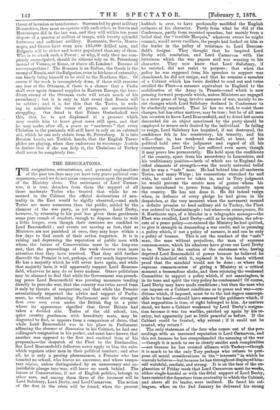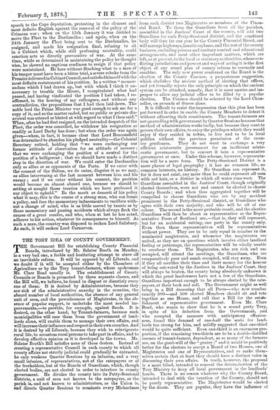THE RESIGNATIONS.
THE resignations, ref-meta-Eons, and personal explanations of the past ten days may yet have very grave political con- sequences —and we do not mean consequences upon the position of the Ministry alone. The retirement of Lord Carnar- von, it is true, detaches from them the support of all those moderate Tories who trusted that while he re- mained in the Cabinet the official declarations of neu- trality in the East would be rigidly observed,—and such Tories are more numerous than the public, misled by the clamour of the war party, as yet suspects. Lord Derby, however, by returning to his post has given these gentlemen some poor crumb of comfort, enough to dispose them to :wait a little longer, even though their destinies are confided to Lord Beaconsfield ; and events are moving so fast, that as Ministers are not punished at once, they may hope within a few days to find much of their action forgotten. It is in raising and depressing the reputation of public men with whom the future of Conservatism must in the long-run rest, that the proceedings of the week deserve even more attention than they have received. That they still further discredit the Premier is not, perhaps, of very much importance. He has a majority which he will never have again, and while that majority lasts, it will apparently support Lord Beacons- field, whatever he may do or leave undone. Grave politicians may be alarmed to find that while the Government was preach- ing peace Lord Beaconsfield was pressing measures tending directly to provoke war, that the country was twice saved from it only by threats of resignation, and that while the Premier ostentatiously requested the advice and support of Parlia- ment, he without informing Parliament sent the strongest fleet ever seen even under the British flag to a point where its appearance signified that Great Britain had taken a decided side. Tories of the old school, too, quiet country gentlemen with hereditary seats, may be disgusted to find, as appears from a comparison of dates, that while Lord Beaconsfield was in his place in Parliament affirming the absence of dissension in his Cabinet, he had one colleague's resignation in his pocket, and must have known that another was opposed to the first and cardinal item of his proposals,—the despatch of the Fleet to the Dardanelles. But Lord Beaconsfield's followers never apply to him the rules which regulate other men in their political conduct ; and after all, he is only a passing phenomenon, a Premier who has founded no school, who leaves no successor, and whose tempo- rary re'gime, unless distinguished by an unnecessary and un- justifiable plunge into -war, will leave no mark behind. The future of Conservatism, if not of English politics, belongs to other men, and among them three of the foremost will be Lord Salisbury, Lord Derby, and Lord Carnarvon. The action of the first in the crisis will be found, when the present hubbub is over, to have profoundly modified the 'English estimate of his character. 'Partly from -what he did at the Conference, partly from repeated speeches, but mainly from a belief that the "terrible Marquis," whatever errors he might commit, would never vacillate, the people had looked oil him as the leader in the policy of resistance to Lord Beacons- field's designs. They thought that he 'inspired Lord Derby with resolution, and Lord'Carnarvon with the bitterness which the war papers said was -wanting to his character. They now know that Lord -Salisbury, if he resisted, did not resist to purpose ; that when the policy he was supposed from his speeches to support



































 Previous page
Previous page